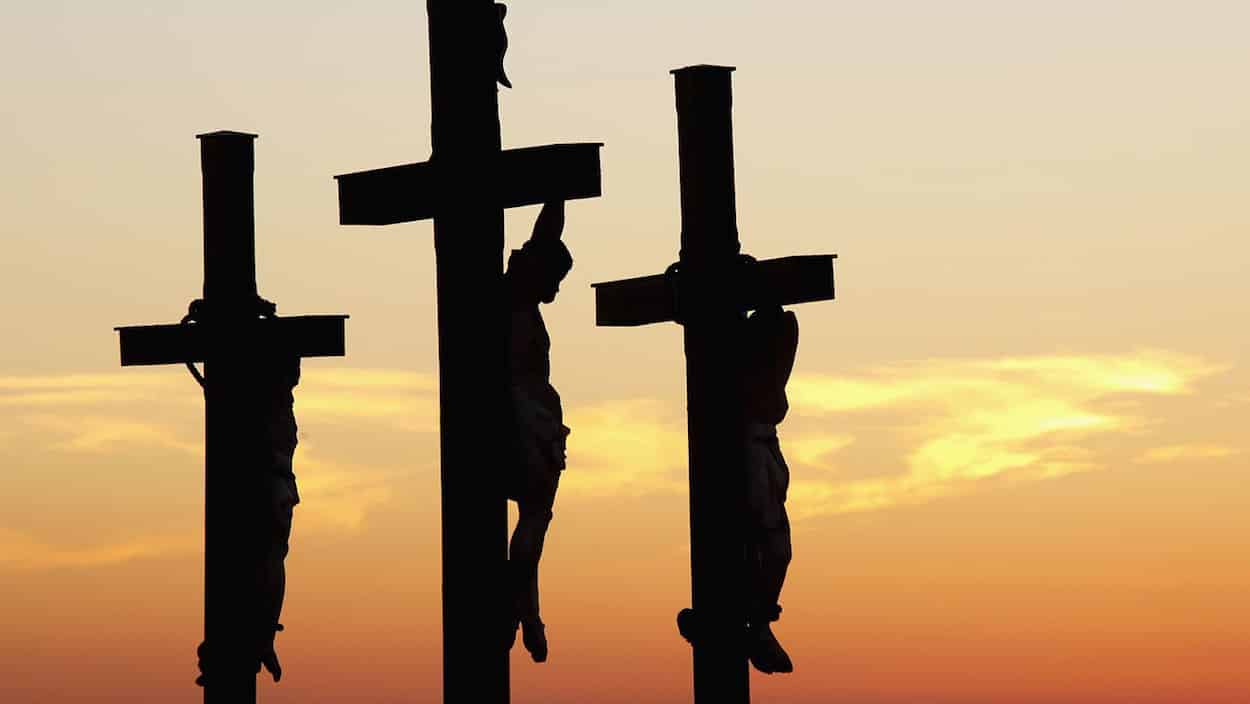Chances are you’ve heard of the famous Passion Play of Oberammergau in Germany. Back in 1633, one hundred villagers died in an epidemic of the bubonic plague, and the people vowed that if God would spare the rest of them, they would reenact the Passion of Christ every ten years from then on until the end of time. The plague was suddenly halted, and the residents of Oberammergau have kept their promise, putting on the play in every year that ends in a zero—missing only 1870, due to the Franco-Prussian War, and 1940, due to World War II. In 2010, they will again perform, 100 times from mid-May until early October, a full-day long, 16-act production, with most of the 5000 villagers participating as actors, stagehands, orchestra or choir members, box office attendants, or other production assistants. There are two actors for each major character, so that they can alternate from one performance to the next. This is especially important for the role of Jesus, for that actor actually has to hang on the Cross for twenty agonizing minutes.
A few decades ago, during one of the years the Passion Play was being performed, two American tourists—a husband and wife—were talking with the actor who had portrayed Christ that day, and he graciously posed for a photograph. Then the wife said to her husband, “Let me take a picture of you with the cross.” The actor agreed this would be all right, so the husband bent down to pick up the cross and lift it onto his shoulder—but it was too heavy for him to budge. “Why in Heaven’s name did you make it so heavy?” he asked the actor. “A cross made of papier-maché would look just as good.” The actor explained, “Sir, I could not play the part of Christ if I did not feel the weight of His Cross” (Dan Moseley, Joyful Giving: Sermons on Stewardship, p. 115). The actor spoke a profound truth: for him to enter into his role, he needed to have some personal understanding and experience of what Jesus endured. In the same way, unless we too have some small but genuine share in Our Lord’s Cross, we cannot be His followers.
Quite often in life, in order to reach something we enjoy, we first have to get through something else that isn’t as much fun. Most people, for instance, like beautiful spring and summer weather—but, for year-round residents of Michigan, that requires making it through another cold, lengthy winter. For students, next year’s eagerly anticipated summer vacation will come only after they’ve completed the long new school year that’s just begun. Children are taught that they don’t get dessert until they’ve cleaned their plates; workers know that they don’t get paid until after they’ve put in hard work on the job, and athletes understand that the excitement of making the playoffs can only follow the rigors of a successful regular season. In spiritual terms, the glory of Easter Sunday always has to be preceded by the agonizing sacrifice of Good Friday. Sometimes we might wish to take short-cuts. That’s what St. Peter was trying to do in the Gospel of Mark (8:27-35). He enjoyed being the one who correctly answered Our Lord’s question about His own identity, thereby winning Jesus’ approval and the admiration—or envy—of the other apostles, but when his Master started talking about His upcoming fate of rejection, suffering, and death, Peter didn’t want to hear it. He preferred to skip over Good Friday and go directly to Easter—but Jesus told him, and everyone else, in a most emphatic and unmistakable manner that it doesn’t work that way; those who wish to follow Him into eternal glory must take up their crosses each day, denying themselves by sacrificing their own desires so as to accomplish the will of God. Jesus Himself did this, fulfilling the prophecy of obedient suffering given in Isaiah (50:5-9), and we must be willing to do the same thing, according to our own vocations and life circumstances. As St. James (2:14-18) insists, mere lip service won’t be enough; if we claim to have faith in Jesus, we have to prove it by our actions.
Throughout much of the Church’s history, and especially today, many people have taken an approach that we might call “papier-maché Christianity”: they want a cross that looks real, but is actually nothing more than a mild inconvenience, if that; they want a religion that has no duties or responsibilities, but only blessings and benefits; they want to be considered followers of Jesus, more or less, but without having to do any spiritual heavy lifting. However, this inauthentic or fake Christianity will, in the end, be of no use to them. Imagine such persons trying to excuse themselves on Judgment Day: “Well, Lord, I went to Mass every Christmas and Easter. I was nice to the people who were nice to me first. I took revenge on other people only some of the time, and I didn’t always hurt the other guy as much as he hurt me. I did good deeds and contributed to charity when other people were looking, and I didn’t cheat as much as some people I know. I followed the teachings of the Church when I agreed with them, and I always obeyed Your laws—unless I was tired, or not in the mood, or felt I had a good excuse for ignoring them.” Just as a papier-maché cross wouldn’t be able to support the weight of the Crucified Christ, so these flimsy excuses will collapse and evaporate under the penetrating gaze of our all-seeing Savior and Judge. We as Americans at the beginning of the 21st century are particularly addicted to convenience, personal freedom, and rebellion against authority—and so we must make a special effort to avoid being led astray.
This means praying regularly, and asking for God’s guidance when we have moral decisions to make, whether large or small; it means taking the teachings of Christ’s Church seriously, even when they’re counter-cultural or when we find them difficult or inconvenient; and it means honestly trying to place God’s will ahead of our own, trusting that as our loving Father, He truly knows what’s best for us. We can offer up all our burdens and sorrows, along with our joys and blessings, as a prayer or sacrifice for Jesus’ glory; we can choose to let each new day bring us one step closer on our lifelong journey to Heaven. Our Lord warns that those who seek to save their lives according to this world’s standards will end up losing everything, but He also promises that those who deny themselves by following Him and living according to the Gospel will gain eternity. He will never give us a cross too heavy to bear, and He is always ready to help us carry it—but accepting it must be our choice.








